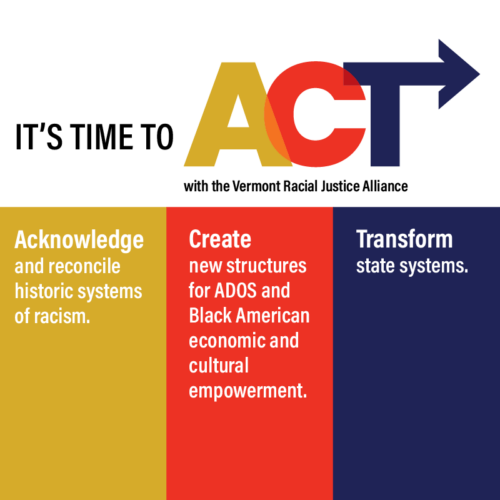Vermont Racial Justice Alliance 2021 Legislative Session Wrap-up
FOR IMMEDIATE RELEASE
May 21, 2021
Contact: Stephanie Gomory, 802-505-5587
[email protected]
Vermont Racial Justice Alliance 2021 Legislative Session Wrap-up
(Burlington, VT) — Today, the Vermont Racial Justice Alliance (VRJA) announced a wrap-up on the 2021 Vermont legislative session. The group took stock of the policy successes around racial justice that materialized this year, as well as the opportunities for progress that stalled or failed to get the necessary support from lawmakers, despite exacerbated disparate adverse social determinant outcomes being faced by Black Vermonters resulting from the COVID-19 pandemic.
In 2021, VRJA introduced a comprehensive strategy referred to as A.C.T., a package of policy proposals created by the Alliance to guide Vermont in “Acknowledging and reconciling historic systems of racism, Creating new structures for American Descendants of Slavery (ADOS) economic and cultural empowerment, and Transforming state systems to better serve ADOS Vermonters.”
“In the midst of a global pandemic, the idea of eradicating systemic racism at a policy level has been largely ineffective because we haven’t gotten the attention and commitment of the legislature needed to achieve the work,” said Mark Hughes, Executive Director of the Vermont Racial Justice Alliance. “But I’m optimistic. We’ll push on with the vast majority of the work which has always been in our communities. Hopefully we’ll come back to a legislature that has the will to get the policy work done.”
Acknowledging and Reconciling Historic Systems of Racism
VRJA put forward an impassioned plea for a moral budget at the top of the session which went largely unanswered and the pending outcome of the FY “22” budget is reflective of that. VRJA’s multi-year work on the constitutional amendment (PR.2) was passed out of the Senate and awaits a House Government Operations public hearing. A VRJA bill seeking to establish a Task Force to Study and develop reparation proposals for the institution of chattel slavery (H.387) remained unvisited in House General and Military Affairs.
The VRJA proposal for Joint Resolution that racism is a public health emergency (J.R.H.6) has struggled for two months in the House Human Services and a failed rule-change attempt to expedite the resolution to the senate. The proposal squeaked in the day before the close of the session, failing to reflect its tone of legislative urgency: racism is a public health emergency.
Creating New Structures (for Economic Empowerment)
At the heart of the work of addressing systemic racism is clearing obstacles for Black economic opportunity. VRJA proposed a bill that would provide racial and social equity in economic opportunity and cultural empowerment (H.406). The bill which remains in House General Housing and Military Affairs never saw testimony this session.
VRJA strongly supported a bill promoting racial and social equity in land access and property ownership (H.273) this session, the primary solution to developing generational wealth in an environment where we understand more than ever that the median wealth of a Black family is 1/13 of that of a White family (and widening). Though testimony was allowed in House General Housing and Military Affairs, attention was diverted to a related policy (H.232) which House Commerce and Economic Development was relieved of. Neither H.273 nor H.232 were reported out of House General Housing and Military Affairs.
Given the historic and existing harm caused by the war on drugs, the specific role of the use of marjuana in this travesty and the severe disparities in access to capital and land as a result of systemic racism, the emerging cannabis market was targeted as a priority for VRJA. H.414 remains in House Government Operations. Despite commitment from the legislature (at the Governor’s urging) to advance an equitable tax and regulate cannabis market in the wake of last year’s S.54 debacle, the legislature again failed to deliver.
Transforming State Systems
At a time with Black and Brown Vermonters in the crosshairs of the impact of systemic racism on social determinants and COVID-19, the VRJA Health Equity Bil (H.210) left the House dismantled and stripped of funding. The Alliance has made their non-support for this bill clear since it left House Health. The bill (1) delays the creation of a Health Equity Department within the Department of Health until 2023; (2) eliminates the continuing medical education requirement for cultural competency training; (3) eliminates the grants to projects proposed by community members to advance Black health equity; and (4) eliminates a grassroots-driven Health Equity Advisory Commission. Note, this is the only policy that the VRJA put forward that advanced this session.
The VRJA Bill which sought to expand the office of Racial Equity, cause the office to be an independent agency, compel agencies governmentwide to adhere to processes defined in the enabling statute and substantially fund the office for technology infrastructure for data collection (H.427) remains in House Government Operations. Despite testimony from the Alliance, House Government Operations moved forward with a simple proposal introduced by Rep Christie (and supported by Director Davis) to appropriate funds for two additional headcount (H.196). This was incorporated into the general budget.
###
About the Vermont Racial Justice Alliance
The mission of the Vermont Racial Justice Alliance is to secure sustainable power, ensure agency and provide security for American Descendants of Slavery (ADOS), while embracing their history and preserving their culture.
The Vermont Racial Justice Alliance and Justice For All are known for their work on the proposal that created the Racial Disparities in the Juvenile and Criminal Justice System Advisory Panel (Act 54, 2017), the Racial Equity Executive Director and Panel (Act 9, 2018, sp), the Office and Standing Committee of Racial Equity, Inclusion and Belonging in Burlington and the Burlington Reparations Task Force.

